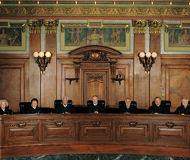9/26/2013
Red Light Camera Case Goes To Illinois Supreme CourtIllinois Supreme Court justices agree to hear a challenge to red light cameras.

By The Expired Meter and DNAinfo Chicago
The Illinois Supreme Court agreed Wednesday to hear a case challenging the legality of Chicago's red light cameras, giving new life to a three-year-old lawsuit dismissed by lower courts. Several motorists filed a lawsuit challenging the validity of red light cameras back in 2010, but the Cook County Circuit Court dismissed the case in 2011. The dismissal was unanimously upheld by the First District of the Illinois Appellate Court in January (view decision).
John Bowman, spokesman for the National Motorists Association, a group that opposed automated traffic enforcement, says their organization is pleased Illinois' high court has decided to take the case.
"It seems like the appellate court that rejected the original class action suit had to engage in some pretty twisted logic to come to its ruling, such as its observation that the cameras don't actually record moving violations since they only capture still images," Bowman said. "We hope the Illinois Supreme Court engages in some common-sense collective thinking when considering the facts of the case."
Simmons Law Firm filed its petition to be heard by the Supreme Court in May. The lawsuit, Keating vs. City of Chicago, claimed the city lacked the authority to establish its red light camera program when it was first created in 2003 because the General Assembly had not yet passed a law allowing that type of automated traffic enforcement in Illinois.
In the class action filing, the plaintiffs claimed all Chicago claimed all red light camera tickets between 2003 and 2006 were invalid because they were issued before state law authorized camera enforcement in Cook, DuPage, Kane, Lake, Madison, Will, McHenry and St. Clair counties. The lawsuit also challenges every red light camera ticket issued after 2006 because Chicago never drafted a new ordinance after the state enacted its red light camera law in 2006.
The city insists it had the right to establish the program under home rule authority, which is the ability for municipalities with populations over 25,000 to pass laws that might normally be issued at the state level. Attorneys for the plaintiffs say home rule should not apply to laws which fall under the Illinois Vehicle Code. A spokesman for the city did not immediately comment on Wednesday's decision. When the appellate court upheld the dismissal of the case in January, Chicago Law Department spokesman Roderick Drew said the court got it right.
"We are pleased that the appellate court has upheld the validity of our ordinance and dismissed this case in its entirety," Drew said.
Chicago's 384 cameras posted at 191 separate intersections generated close to $70 million a year in revenue in 2012.
In the latest decision, Illinois Supreme Court Justice Anne Burke recused herself from deciding whether the court should take the case. Burke is the wife of Alderman Ed Burke, who serves as chairman of the city council's finance committee.
Detailed coverage of Chicago motoring issues can be found at The Expired Meter and at DNAinfo Chicago.


